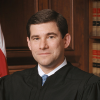Officials
Offical

Since January 3, 2017, the acting chair of the United States Sentencing Commission (USSC) has been William H. Pryor, a judge on the Eleventh Circuit U.S. Court of Appeals in Atlanta. USSC is an independent agency in the federal judicial branch. Its job is to create sentencing guidelines so that defendants convicted of similar crimes will receive similar sentences in federal courts across the country. USSC has seven voting members appointed by the U.S. president and confirmed by the Senate. Pryor was first named to USSC by President Barack Obama on April 15, 2013, to a position that expires on October 31, 2017.
Born April 26, 1962, in Mobile, Alabama, to William Holcombe Pryor Sr., a high school bandleader, and Laura Louise (Bowles), a teacher, Pryor was the oldest of four siblings. Although his parents were Democrats, Pryor began handing out flyers for a Republican candidate while he was still in elementary school. Growing up Catholic, Pryor graduated McGill–Toolen Catholic High School in Mobile in 1980. Pryor won a band scholarship to Northeast Louisiana University (now University of Louisiana, Monroe), earning a B.A. in 1984. Pryor earned his J.D. at Tulane University Law School in 1987, where he was editor-in-chief of the Tulane Law Review.
After law school, Pryor clerked for the legendary John Minor Wisdom, a judge on the U.S. Court of Appeals for the Fifth Circuit who authored or joined in numerous key civil rights decisions in the 1950s and 1960s, from 1987 to 1988.
Pryor practiced law in Birmingham, Alabama, for the next eight years, first at Cabaniss, Johnston, Gardner, Dumas & O’Neal from 1988 to 1991, and then at Walston, Stabler, Wells, Anderson & Bains from 1991 to 1995. He also taught maritime law as an adjunct professor at Samford University’s Cumberland School of Law from 1989 to 1995.
Pryor switched to government work in 1995 when Alabama Attorney General Jeff Sessions, who is now U.S. Attorney General, hired him to serve as deputy attorney general. When Sessions won a U.S. Senate seat in 2007, Pryor became attorney general of Alabama. He was elected in 1998 and reelected in 2002, resigning in February 2004 when President George W. Bush appointed him to the 11th Circuit Court of Appeals.
As Alabama attorney general, Pryor backed efforts to establish the Alabama Sentencing Commission as a way to reform criminal sentences. Reliably conservative, Pryor called Roe v. Wade “the worst abomination of constitutional law in our history,” and in a brief to the Supreme Court warned that if it recognized a constitutional right to homosexual sex, it would “logically extend” to activities like “prostitution, adultery, necrophilia, bestiality, incest and pedophilia.” However, he has also angered religious conservatives with some of his actions. For example, while he was Alabama’s attorney general in 2003, he removed from office Alabama Chief Justice Roy Moore because Moore refused to follow a federal court order to remove a Ten Commandments monument from the state Supreme Court building. In response to Moore’s argument that he was following his Christian duty, Pryor noted that, “Christ did not command us to maintain a monument of the Ten Commandments in the rotunda of the State Judicial Building.”
Since 2006, Pryor has been a visiting professor at the University of Alabama School of Law. Pryor and his wife, Kristan Wilson Pryor, have two daughters, Caroline and Victoria.
-Matt Bewig
To Learn More:
Potential Nominee Profile: William Pryor (Expanded) (by Kevin Russell and Charles Davis, SCOTUS Blog)
Trump’s Potential SCOTUS Pick Has Said Crazy Awful Things About Queer People (by Cavan Sieczkowski, Huffington Post)
Supreme Court Candidate Ties to Monroe (by Kayla Lusby, MyArkLaMiss.com)
Pryor: Perhaps the most Polarizing Supreme Court Justice Possibility (by Kimberley Kindy, Washington Post)
Federalism and Sentencing Reform in the Post-Blakely/Booker Era (by William H. Pryor Jr., Ohio State Journal of Criminal Law)
Moral Duty and the Rule of Law (by William H. Pryor Jr., Harvard Journal of Law & Public Policy)
- Latest News
- D.C. Public Schools will Teach all Second-Graders to Ride a Bike
- New Rule in Germany Limits Sales of Sex-Themed E-Books to 10pm to 6am
- What Happened to the 6-Year-Old Tibetan Boy the Chinese Government Kidnapped 20 Years Ago?
- U.S. Ambassador to Turkey Photoshops his Hair Color to Mock Turkish Mayor
- Mystery Artist Calls Attention to Unfixed Potholes by Drawing Penises around Them





